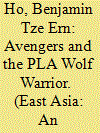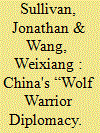| Srl | Item |
| 1 |
ID:
188433


|
|
|
|
|
| Summary/Abstract |
In recent years, some scholars of international politics have argued for the need to integrate the use of visual media into our understanding of global politics. In this respect, film (or movies) represents an effective media of communicating powerful ideas and political worldviews through a smorgasbord of sound and sensory experiences. This essay seeks to draw on the theoretical insights of scholars of visual international politics to analyze the ongoing geopolitical conflict between the United States and China. It will do so by examining two box-office hits in the West and China, namely, the Avengers and Wolf Warrior. Through a study of some of the key storylines in these films, this essay seeks to flesh out the differences in Sino-Western conceptions of patriotism, good and evil, and salvation. It argues that these differences are not just a matter of aesthetic preferences, but reflect more fundamental ideas and political worldviews salient in the thinking of China and the West.
|
|
|
|
|
|
|
|
|
|
|
|
|
|
|
|
| 2 |
ID:
189905


|
|
|
|
|
| Summary/Abstract |
For all the popular interest in “wolf warrior diplomacy,” scant attention has been paid to the internal logics and mechanics of representative communications, notably the intersection with grassroots cyber-nationalism. Centring the connections between official and unofficial actors, we situate Chinese diplomatic communications within the domestic nationalist cyberspace cultures that demand and nourish the “dare to fight” orientation of formal Chinese diplomacy on the international stage. We argue that there is a synergistic interaction between officials and popular nationalism that creates bottom-up incentives to adopt a “wolf warrior” posture, distinct from simultaneous top-down pressures from the central leadership under Xi Jinping to appropriately represent China's “confident rise.” We show through case studies involving MoFA spokesperson and archetypal “wolf warrior” Zhao Lijian, that this interaction extends to sharing unofficial content and ideas in a mutually reinforcing cycle that facilitates a harder edge to diplomatic communications.
|
|
|
|
|
|
|
|
|
|
|
|
|
|
|
|